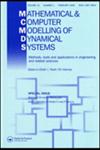Cycle-by-Cycle Combustion Optimisation: Calibration of Data-based Models and Improvements of Computational Efficiency
IF 1.8
4区 数学
Q3 COMPUTER SCIENCE, INTERDISCIPLINARY APPLICATIONS
Mathematical and Computer Modelling of Dynamical Systems
Pub Date : 2022-07-05
DOI:10.1080/13873954.2022.2052111
引用次数: 0
Abstract
ABSTRACT Modern combustion engines require an efficient cycle-by-cycle fuel injection control scheme to optimise the single combustion events during transient operation. The online optimisation of the respective control inputs typically needs accurate while sufficiently simple models of the combustion quantities. Based on a recently presented cycle-by-cycle optimisation scheme with a hybrid model, this paper focuses on two aspects to enhance the accuracy as well as computational efficiency for an online computation. Firstly, the proper calibration of Gaussian processes nested in a combined physics-/data-based model structure is addressed. Respective test bench measurements and a tailored two-step training procedure are presented. Secondly, the computational efficiency of the online cycle-by-cycle optimisation is increased by mapping computationally intensive calculations into the data-based models through offline preprocessing. In addition, a data-driven approximation of the complete optimisation scheme is proposed to further minimise the computational demand. Simulation studies are used to evaluate the performance of these approaches.循环逐循环燃烧优化:基于数据的模型的校准和计算效率的提高
现代内燃机需要一种高效的逐循环燃料喷射控制方案,以优化瞬态运行期间的单个燃烧事件。各个控制输入的在线优化通常需要燃烧量的精确而足够简单的模型。基于最近提出的具有混合模型的逐周期优化方案,本文重点从两个方面提高在线计算的精度和计算效率。首先,解决了嵌套在基于物理/数据的组合模型结构中的高斯过程的正确校准问题。给出了各自的测试台测量结果和量身定制的两步训练程序。其次,通过离线预处理将计算密集型计算映射到基于数据的模型中,提高了在线逐周期优化的计算效率。此外,还提出了完整优化方案的数据驱动近似,以进一步最小化计算需求。仿真研究用于评估这些方法的性能。
本文章由计算机程序翻译,如有差异,请以英文原文为准。
求助全文
约1分钟内获得全文
求助全文
来源期刊
CiteScore
3.80
自引率
5.30%
发文量
7
审稿时长
>12 weeks
期刊介绍:
Mathematical and Computer Modelling of Dynamical Systems (MCMDS) publishes high quality international research that presents new ideas and approaches in the derivation, simplification, and validation of models and sub-models of relevance to complex (real-world) dynamical systems.
The journal brings together engineers and scientists working in different areas of application and/or theory where researchers can learn about recent developments across engineering, environmental systems, and biotechnology amongst other fields. As MCMDS covers a wide range of application areas, papers aim to be accessible to readers who are not necessarily experts in the specific area of application.
MCMDS welcomes original articles on a range of topics including:
-methods of modelling and simulation-
automation of modelling-
qualitative and modular modelling-
data-based and learning-based modelling-
uncertainties and the effects of modelling errors on system performance-
application of modelling to complex real-world systems.

 求助内容:
求助内容: 应助结果提醒方式:
应助结果提醒方式:


